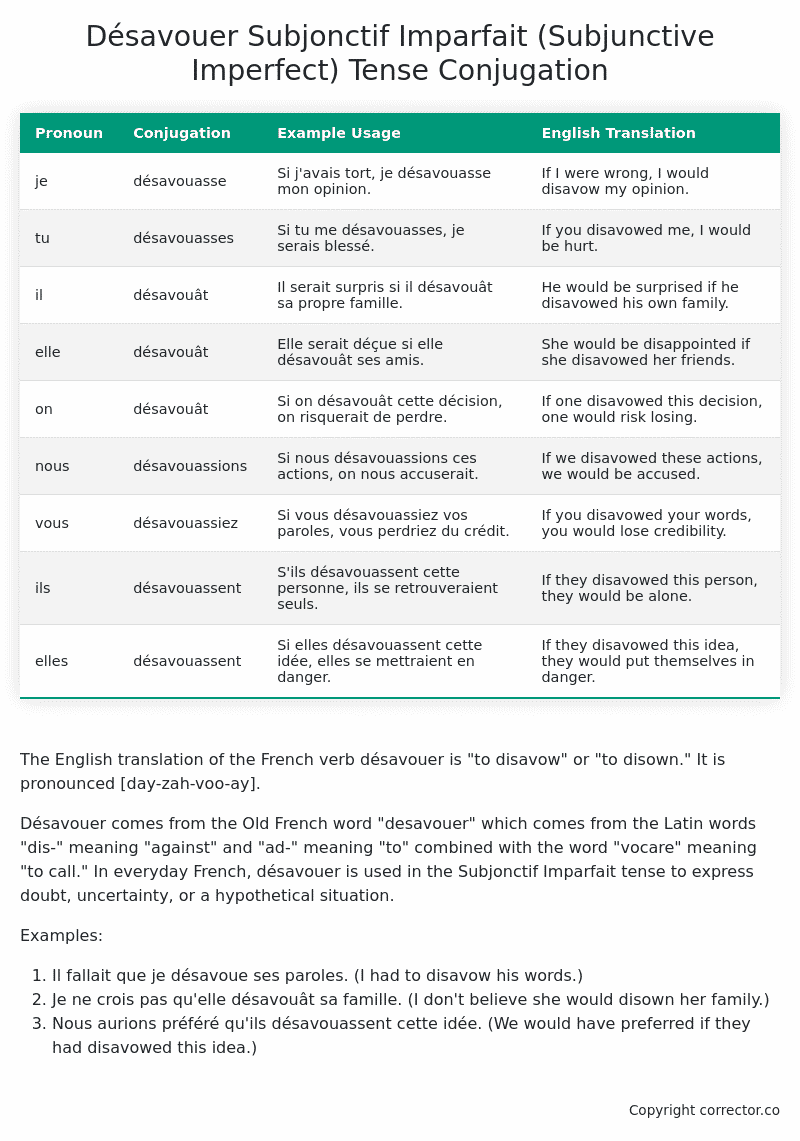Subjonctif Imparfait (Subjunctive Imperfect) Tense Conjugation of the French Verb désavouer
Introduction to the verb désavouer
The English translation of the French verb désavouer is “to disavow” or “to disown.” It is pronounced [day-zah-voo-ay].
Désavouer comes from the Old French word “desavouer” which comes from the Latin words “dis-” meaning “against” and “ad-” meaning “to” combined with the word “vocare” meaning “to call.” In everyday French, désavouer is used in the Subjonctif Imparfait tense to express doubt, uncertainty, or a hypothetical situation.
Examples:
- Il fallait que je désavoue ses paroles. (I had to disavow his words.)
- Je ne crois pas qu’elle désavouât sa famille. (I don’t believe she would disown her family.)
- Nous aurions préféré qu’ils désavouassent cette idée. (We would have preferred if they had disavowed this idea.)
Table of the Subjonctif Imparfait (Subjunctive Imperfect) Tense Conjugation of désavouer
| Pronoun | Conjugation | Example Usage | English Translation |
|---|---|---|---|
| je | désavouasse | Si j’avais tort, je désavouasse mon opinion. | If I were wrong, I would disavow my opinion. |
| tu | désavouasses | Si tu me désavouasses, je serais blessé. | If you disavowed me, I would be hurt. |
| il | désavouât | Il serait surpris si il désavouât sa propre famille. | He would be surprised if he disavowed his own family. |
| elle | désavouât | Elle serait déçue si elle désavouât ses amis. | She would be disappointed if she disavowed her friends. |
| on | désavouât | Si on désavouât cette décision, on risquerait de perdre. | If one disavowed this decision, one would risk losing. |
| nous | désavouassions | Si nous désavouassions ces actions, on nous accuserait. | If we disavowed these actions, we would be accused. |
| vous | désavouassiez | Si vous désavouassiez vos paroles, vous perdriez du crédit. | If you disavowed your words, you would lose credibility. |
| ils | désavouassent | S’ils désavouassent cette personne, ils se retrouveraient seuls. | If they disavowed this person, they would be alone. |
| elles | désavouassent | Si elles désavouassent cette idée, elles se mettraient en danger. | If they disavowed this idea, they would put themselves in danger. |
Other Conjugations for Désavouer.
Le Present (Present Tense) Conjugation of the French Verb désavouer
Imparfait (Imperfect) Tense Conjugation of the French Verb désavouer
Passé Simple (Simple Past) Tense Conjugation of the French Verb désavouer
Passé Composé (Present Perfect) Tense Conjugation of the French Verb désavouer
Futur Simple (Simple Future) Tense Conjugation of the French Verb désavouer
Futur Proche (Near Future) Tense Conjugation of the French Verb désavouer
Plus-que-parfait (Pluperfect) Tense Conjugation of the French Verb désavouer
Passé Antérieur (Past Anterior) Tense Conjugation of the French Verb désavouer
Futur Antérieur (Future Anterior) Tense Conjugation of the French Verb désavouer
Subjonctif Présent (Subjunctive Present) Tense Conjugation of the French Verb désavouer
Subjonctif Passé (Subjunctive Past) Tense Conjugation of the French Verb désavouer
Subjonctif Imparfait (Subjunctive Imperfect) Tense Conjugation of the French Verb désavouer (this article)
Subjonctif Plus-que-parfait (Subjunctive Pluperfect) Tense Conjugation of the French Verb désavouer
Conditionnel Présent (Conditional Present) Tense Conjugation of the French Verb désavouer
Conditionnel Passé (Conditional Past) Tense Conjugation of the French Verb désavouer
L’impératif Présent (Imperative Present) Tense Conjugation of the French Verb désavouer
L’infinitif Présent (Infinitive Present) Tense Conjugation of the French Verb désavouer
Struggling with French verbs or the language in general? Why not use our free French Grammar Checker – no registration required!
Get a FREE Download Study Sheet of this Conjugation 🔥
Simply right click the image below, click “save image” and get your free reference for the désavouer Subjonctif Imparfait tense conjugation!

Désavouer – About the French Subjonctif Imparfait (Subjunctive Imperfect) Tense
Formation
Common Everyday Usage Patterns
Interactions with Other Tenses
Subjonctif Présent
Indicatif Passé Composé
Conditional
Conditional Perfect
Summary
I hope you enjoyed this article on the verb désavouer. Still in a learning mood? Check out another TOTALLY random French verb conjugation!


